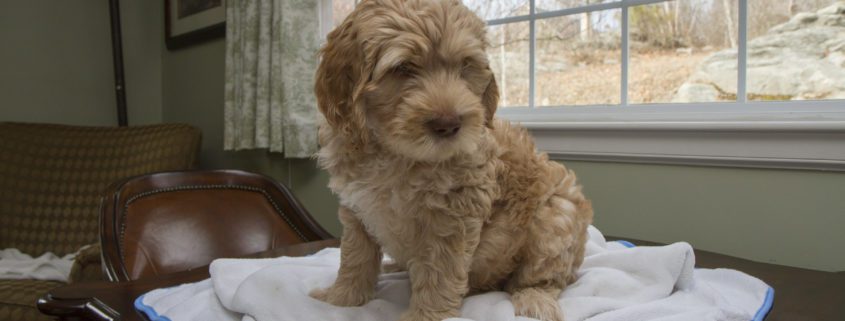Puppy Care: From 3 to 4 Months
Previously, we provided a guide on caring for your puppy for the first 8 weeks of their life. Now, we’ll take a look at the important things to do and watch for between 8 and 16 weeks, or 3 to 4 months.
From between 8 and 12 weeks old, your puppy is just starting to be away from their mother, and may still be with his siblings at this time. This is around the time that your puppy is refining his or her physical coordination. Around 8 weeks, you can begin housebreaking your puppy. By nine weeks, it’s possible to train your puppy, but if your puppy doesn’t catch on right away, don’t worry.
The most important thing is to be extremely positive to your puppy during this time, even if your puppy is struggling with housebreaking or training. Puppies are extremely sensitive to upsetting incidents at this point. So it’s very important to be as positive and comforting to the puppy as possible. An occasional accident should not be overreacted to, as they will simply happen.
By 12 weeks, your puppy will have their first permanent teeth coming in. It’s important to have suitable gnawable items available. During this time, you’ll want to teach your puppy the difference between good items and off-limits items to gnaw on. Unfortunately, sometimes your puppy will need to be shown the difference endlessly, and may still have the urge to chew on some things they should not. Just be patient. The best method is to use redirection to correct items as much as possible.
Around this time, up until 6 months old, your puppy try to chew everything in sight. Also, your puppy will try challenging the authority of the care provider or owner. This is because in the wild, dogs prefer to have a strong leader. Sometimes, all that needs to be done is help the puppy feel like part of the family, which is enough for the puppy to adapt to his or her new “pack.”
In some cases, the dog will still be defiant. Sometimes, it may take professional training to curb any of these behavioral issues. But, the most important training is actually for the dog owner who should be careful to not overreact. The dog owner should be assertive when the dog is actually doing something wrong. It’s important to be positive, but firm, just as you would be with a person.
Dogs will be dogs. Just be sure that particularly destructive behaviors don’t become habits. Like it’s okay for people to make a mistake once in awhile, it’s okay be understanding, but especially with puppies.



